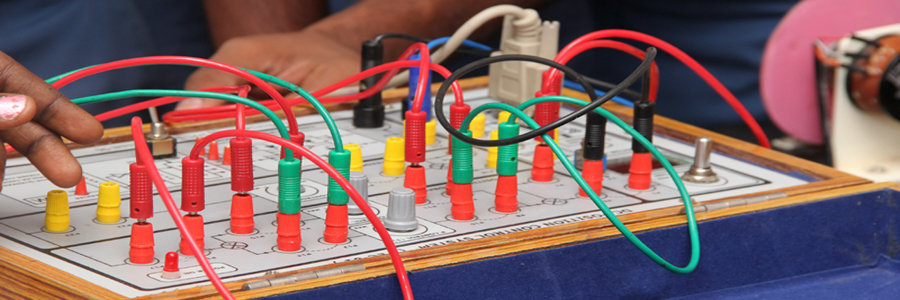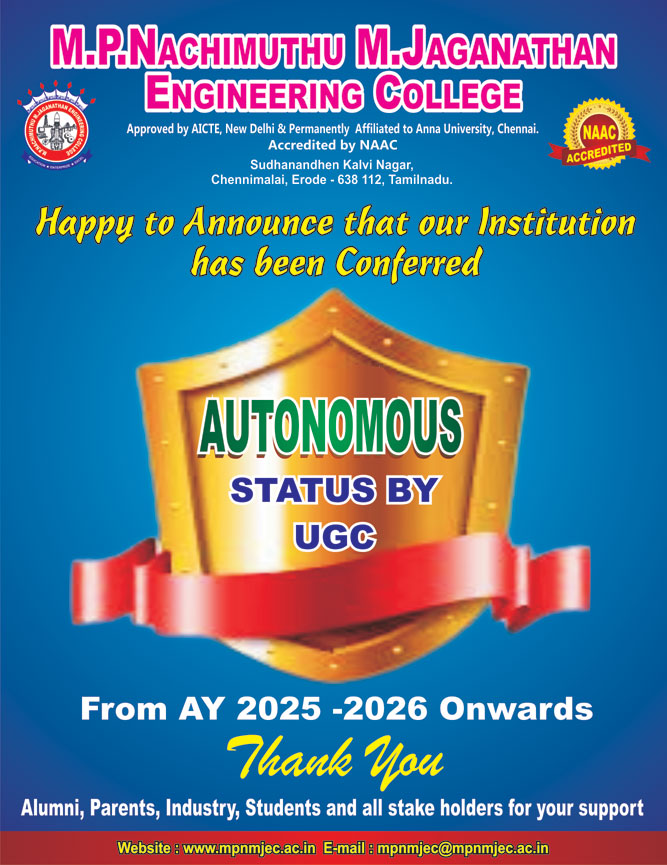VISION
To provide value based technical education to the learners in the field of electrical and electronics engineering and prepare them to become successful professionals and entrepreneurs of the societies.
MISSION
- To disseminate technical knowledge to the students to excel as prominent electrical and electronics engineering with multi-disciplinary skills.
- To provide better infrastructure facilities and support system to improve research, consultancy and entrepreneurial.
- To inculcate moral and ethical values among graduates.
PROGRAM EDUCATIONAL OBJECTIVES (PEOs)
- Find employment in Core Electrical and Electronics Engineering and service sectors.
- Get elevated to technical lead position and lead the organization competitively.
- Enter into higher studies leading to post-graduate and research degrees. Become consultant and provide solutions to the practical problems of core organization.
- Become an entrepreneur and be part of electrical and electronics product and service industries.
PROGRAM OUTCOMES (POs)
- Apply the knowledge of mathematics, science, engineering fundamentals and an engineering specialization to the solution of complex engineering problems.
- Identify, formulate, review research literature, and analyze complex engineering problems reaching substantiated conclusions using first principles of mathematics, natural sciences and engineering sciences.
- Design solutions for complex engineering problems and design system components or processes that meet the specified needs with appropriate consideration for the public health and safety, and the cultural, societal, and environmental considerations.
- Use research-based knowledge and research methods including design of experiments, analysis and interpretation of data, and synthesis of the information to provide valid conclusions.
- Create, select, and apply appropriate techniques, resources and modern engineering and IT tools including prediction and modeling to complex engineering activities with an understanding of the limitations.
- Apply reasoning informed by the contextual knowledge to assess societal, health, safety, legal and cultural issues and the consequent responsibilities relevant to the professional engineering practice.
- Understand the impact of the professional engineering solutions in societal and environmental contexts, and demonstrate the knowledge of and need for sustainable development.
- Apply ethical principles and commit to professional ethics and responsibilities and norms of the engineering practice.
- Function effectively as an individual, and as a member or leader in diverse teams and in multidisciplinary settings.
- Communicate effectively on complex engineering activities with the engineering community and with society at large, such as, being able to comprehend and write effective reports and design documentation, make effective presentations and give and receive clear instructions.
- Demonstrate knowledge and understanding of the engineering and management principles and apply these to one‘s own work, as a member and leader in a team to manage projects and in multidisciplinary environments.
- Recognize the need for, and have the preparation and ability to engage in independent and life-long learning in the broadest context of technological change.
PROGRAM SPECIFIC OUTCOMES (PSOs)
- Foundation of Electrical Engineering: Ability to understand the principles and working of electrical components, circuits, systems and control that are forming a part of power generation, transmission, distribution, utilization, conservation and energy saving. Students can assess the power management, auditing, crisis and energy saving aspects.
- Foundation of Mathematical Concepts: Ability to apply mathematical methodologies to solve problems related with electrical engineering using appropriate engineering tools and algorithms.
- Computing and Research Ability: Ability to use knowledge in various domains to identify research gaps and hence to provide solution which leads to new ideas and innovations.




